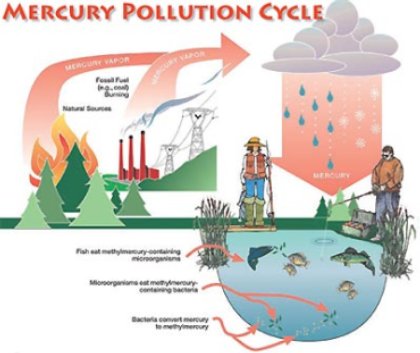| You are at Toxics Alert > News > Exposure survey highlights need for global mercury ban | |||
 |
 |
||
|
Subscribe || Tell a Friend || Print View | ||
| Home | Editorial | Feature | Interview | News | Policy | Updates | Reports / International News | Partner | |||
|
Exposure survey highlights need for global mercury banSource: Toxics Link, Date: , 2007More than one in six women involved in a small-scale study in 21 countries, including India, has a level of mercury above a widely-accepted recommended safety dose, according to a report titled 'Halting the child brain drain: Why we need to tackle global mercury contamination', released recently by the “Stay Healthy, Stop Mercury” campaign.
Dutch paediatrician Gavin ten Tusscher said at the release in Brussels that exposure to mercury at current environmental levels is now a recognised danger for the next generation. “Mercury has long been recognised as a major source of toxicity in children causing reduced cognitive functioning, including reduced I.Q. However, we are now seeing that even 'low' exposure levels can cause damage to the developing brain of the foetus and infant. These are mercury levels that are not known to cause acute poisoning or ill health in adults,” he said. The “Stay Healthy, Stop Mercury” campaign aims to raise awareness of a potential “child brain drain” taking place in Europe and around the world as a result of environmental mercury pollution. The two groups coordinating the campaign – the Health & Environment Alliance and Health Care Without Harm – are calling on the EU to show leadership in efforts to control environmental mercury pollution by securing a global ban on mercury. Ultimately, the only solution is to eliminate all uses of mercury everywhere, to collect and store remaining mercury safely and to clean up mercury pollution. The European Union has already implemented a number of measures restricting the use of mercury in certain everyday products. Karolina Ruzickova, Health Care Without Harm Europe, told the meeting in Brussels that she believes the European institutions should now go further on the elimination of mercury in products, especially in medical devices. “We would like to see the European institutions adopt a ban on mercury in measuring devices including those used in healthcare such as blood pressure devices, granting exceptions only if there is evidence that no safe and accurate alternatives are available for clinical use,” she said. Harmful human exposure to mercury is mainly through the consumption of certain types of fish. The European Food Safety Authority (EFSA) has put out guidelines on fish consumption for certain vulnerable groups but they are weak and not widely known. |
•
Home •
FEATURE •
INTERVIEW •
NEWS •
POLICY •
UPDATES •
REPORTS / INTERNATIONAL NEWS •
 Although the small-scale survey involved approximately 250 women, the results reaffirm figures published in the EU’s 2005 extended impact assessment. The findings are worrying because scientific reports have shown conclusively that low-level exposure to mercury in the womb can cause brain damage in children.
Although the small-scale survey involved approximately 250 women, the results reaffirm figures published in the EU’s 2005 extended impact assessment. The findings are worrying because scientific reports have shown conclusively that low-level exposure to mercury in the womb can cause brain damage in children.